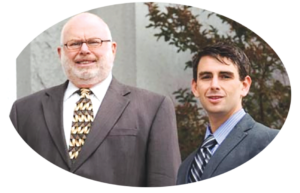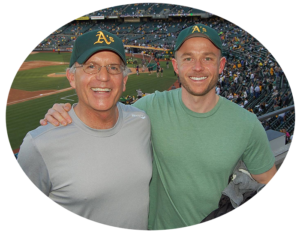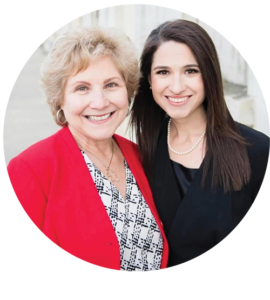Growing Up Legal
When a toddler starts cross-examining you, every parent who is a lawyer must say to themselves, “Oh boy. Give this kid a suit and a briefcase, I know where this is going”.
In a virtual email roundtable with some Contra Costa County lawyer-parent, lawyer-offspring duos we covered some of the questions that come up in families with multigenerational attorneys. Coming from a background of being a second-generation attorney myself, I am glad to share others’ experiences.
There is a conundrum – the law is a wonderful profession; however, at some point in most of our careers we have wondered if there is not an easier way to earn a living.
Merritt Weisinger and Ethan Weisinger, Karen Fenchel and Valerie Fenchel and Stan Casper and Nick Casper contributed to the lively discussion that follows.

When your son or daughter was young, did you hope he or she would become a lawyer?
Merritt: Yes! I always thought Ethan would make a good lawyer. He’s a lot like me (poor guy). I actually thought my daughter Lizzy would be a lawyer, but she had the audacity to become A Licensed Clinical Psychologist – the kind of people I usually beat up on as expert witnesses in family law cases.
Stan: When Nick was growing up, I had no specific hopes for him becoming a lawyer. I was one of those fortunate parents who had a kid who was highly self-motivated and seemed to excel in a lot of areas. I just went with the flow. Nick played Brom Bones in the fifth-grade play of the Legend of Sleepy Hollow, I thought he might have a career in acting. Nick could sink 30-foot baskets in our backyard, and I thought he might be a three-point specialist in the NBA. He was artistic and great at mechanical drawing, so I was sure he would be an architect. Given his range of skills, becoming a lawyer just was not at the top of my list.
Karen: I encouraged each of my three children to follow their own path, to make their own choices. I had no preference as to what field they chose, what road they followed. Valerie had many future objectives commencing with her desire to be a farmer after visiting Monticello in Charlottesville, Virginia. She loved animals and considered being a veterinarian. She considered teaching based on her love for children. Her public speaking accolades in addition to her passion for assisting people, empowering women, and making a difference for families led her to the field of family law.

Did your parent inspire you to become a lawyer?
Nick: Without a doubt. My dad would frequently share twists and turns in his law practice with me, many times about cases involving serious injury or wrongful death that our firm continues to handle. The scissor lift death case; the case of the worker who fell to his death from an unguarded opening in a roof. As a kid who had a natural inclination toward the law, as well as morbid curiosity, these cases fascinated me. My dad was supportive of all my academic interests throughout my childhood and there was never even a hint that he was hoping I would follow his path into law. In the end, what I wanted to do above all else was what he did.
Valerie: My parents both encouraged me to become a lawyer. From a young age, I am told I complained that life was “unfair” and advocated for the underdog. While I was growing up, I saw how becoming a lawyer empowered my mother to be a financially independent career woman who advocated for the rights of others. She has definitely been a role model for me and influenced my journey.
Ethan: Yes, my father has mentored me throughout much of my life. My passion for literature and writing came from my father’s inspiration. I can also credit my father with leading me to become an attorney through years of zealous debates on all aspects of life.

At family dinners and holidays, do you find yourselves talking about the law?
Karen: As a family law attorney, I sometimes discussed interesting cases, challenging clients, and unusual situations around the dinner table. When my two youngest were in high school, I opened an office next to the school, so they could walk to my office after school. They were always aware of my profession and the goals and aspirations I voiced for my clients.
Merritt: Yes, quite often. It’s who I am and what I (sometimes) know, and there is so much human interest in these cases.
Stan: We talked about politics and the law fairly regularly as a family. Back in the 80s and 90s I was trying a lot of cases, both criminal and civil. Inevitably, the reasons why my client should prevail got a good airing with my captive audience. I guess Nick caught on to the excitement.
What strength do you most admire in your parent?
Valerie: My mom is extremely ethical and built a reputation of integrity for herself and with the community. She is kind and thoughtful in her communications and interactions with others from judges, to opposing counsel to clients. When I started practicing, I noticed people spoke fondly about my mother. When my mother transitioned her practice to collaborative law and mediation and started referring her litigation cases to me, it made me feel good to hear her former clients speak so highly of my mom. I am so proud of her high success rate in mediation cases.
Ethan: My father is a zealous advocate for his clients. I admire his ability to balance advocacy while achieving amicable resolutions, especially in difficult cases. My father has always said that while counsel may be adversaries, they are not enemies. I admire my father’s ability to maintain a rational debate in cases where passions are high.
Nick: There is a litany of attorney strengths I admire in my dad, but his attention to detail stands out. A significant number of cases may turn on a single document such as an email, a chart note, or an internal memo. A less meticulous practitioner may have missed that detail amidst a mountain of documents. He never skated through a case; he would put the time in to master every minute detail. My dad put painstaking preparation into every deposition, mediation, trial.
What is different about the practice of law today than it was when you began practicing?
Stan: Technology, technology, technology. Like many “old timers,” I could have never imagined doing sophisticated on-line legal research, social media investigations, and e-discovery that I see as so integral to the practice today. At the start of my practice, virtually all important relationships in practice were developed in person or over long phone calls. I may be lapsing into a bit of “things were better in my day,” but in the old days, professional relationships were much more personal; however, I am less sure if that was a good thing or a bad thing.
Karen: The number of women attorneys and judges has grown considerably. There is a comradery among women attorneys, a supportive community, as with the Women’s Section of the Bar. Women have added warmth, kindness, and humanity to the legal profession. This does not discount the brilliant and caring male jurists like the late Commissioner Jeffery Huffaker.
Merritt: It’s a different world. Advertising or solicitation of cases was an offense that could result in suspension or disbarment. Today, with advertising, the law is leaning toward being a business more than a profession. The level of civility is different. Today, it all seems to be about winning or losing rather than doing the right thing, justice, and fairness. When I came out of law school having clerked for major firms for about two years, I had a civil litigation practice for many years before I began to specialize. Today people come out of law school and go right into a specialization. Unfortunately, this leaves some lawyers without knowledge of civil procedure, or any area of law outside their expertise. There is a lack of cross-pollination. There was a time when lawyers were respected as learned and knowledgeable. I worry it has become a job more than a profession or calling. Finally, we handled actual books!
We had typewriters and Selectrics. I see attorneys practicing “blurb law” rather than reading and citing cases. Is it better? In some ways. Worse? In some ways.
How do you practice differently than your parent?
Ethan: I have the assistance of multiple staff members to handle a greater volume of cases. It takes many people working behind the scenes to provide excellent service to clients. My father’s style as an attorney was to handle all aspects of a case. I also deal with more of my client’s emotional turmoil, my father stuck more to the legal issues and believed a client’s emotional issues were the province of therapists.
Valerie: My mother preferred mediation and collaborative law. I remember her doing trial work with great success, but her passion has been in alternative dispute resolution. I enjoy litigation work. I am passionate about empowering clients and getting the legal results they deserve. If negotiation fails, I vehemently believe court intervention is the only viable option. My mom ran her firm as a solo practitioner, whereas I have hired a team of experienced litigators so that we are able to effectively handle complex litigation. I prefer the team approach to ensure we have the legal power and expertise to strategically negotiate favorable settlements and also prepare a client’s case for a favorable court outcome. In 2022, I likely have different opportunities than my mother did, and a focus on entrepreneurship. As a firm owner, I have responsibilities to our clients and our team.
Nick: In baseball parlance, my dad was a “five-tool player” in that in possessed all the important skills for success. However, if a firm grasp of technology is one of those tools, he was a four-tool player. I am fortunate to have grown up in the digital age and have a natural ability to understand and utilize contemporary technology, from online legal research to searching through scanned documents using OCR. My dad is not a Luddite and always puts in the time to embrace the latest technologies, but it was more of a struggle to adapt. I definitely encountered three-ring binders filled with emails that he printed, something that has occasionally been a source of good-natured teasing.